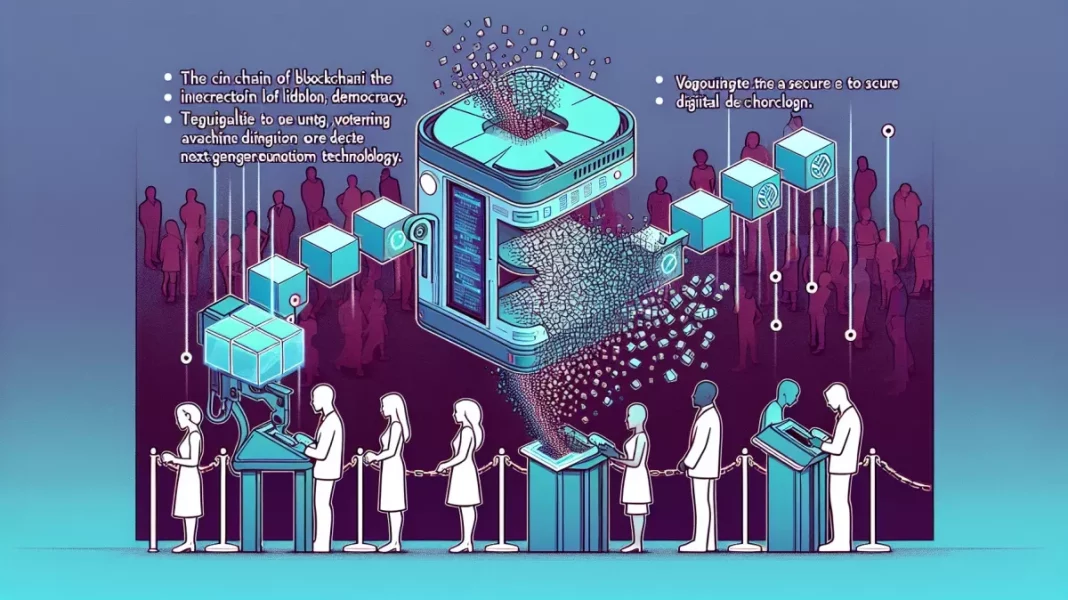In an era characterized by remarkable technological advancements and their progressive impacts on everyday life, blockchain technology is fast emerging as a game-changer in various sectors. One area showing considerable potential for this technological innovation is the voting process. In light of modern challenges, blockchain technology’s role in secure voting is garnering significant attention from researchers, governments, and tech-enthusiasts alike.
The application of blockchain in voting embodies a truly transformative potential. Through ensuring security, transparency, and fraud-deterrence, it promises to address issues that have long plagued our electoral systems. Therefore, hacking this next-generation technology for secure voting is becoming increasingly crucial.
##Understanding Blockchain
Blockchain, at its core, is a distributed digital ledger that records transactions across several computers. These records, colloquially dubbed “blocks”, are linked using cryptography, making them resistant to any form of data modification. Consequently, cultivating an atmosphere of trust and security.
A robust facet of blockchain technology is decentralization. Traditional central databases are vulnerable to hacking, power outages, or even human errors. However, by storing data across several networks, blockchain safeguards against these pitfalls, enhancing reliability and robustness.
##The Downfall of Current Voting Systems
Despite advancements in technology, multiple countries still rely on paper ballots for voting, a practice susceptible to human error, fraud, and inefficiencies. Even digital voting systems using central databases are not hack-proof, as seen from the manipulation of the 2016 US Election by foreign hackers.
Moreover, there’s a glaring lack of transparency in current systems. Citizens cast their votes amid fears of rigging and misconduct, as there’s no substantial way to verify the vote’s ultimate destination.
##Implementing Blockchain in Voting – A Solution
Blockchain technology presents a solution to these issues. Its transparency feature ensures that every vote is traceable, verifiable, and auditable, thereby deterring fraud. Simultaneously, the security offered by decentralized ledger technology can protect election data from malignant manipulations and cyber attacks.
The application of blockchain doesn’t cease at security and transparency; it also promises to boost voter turnout. As an app-based approach, blockchain-based voting could remove barriers associated with voting locations and mobility, allowing more citizens to participate in the democratic process conveniently from their mobile devices.
Thus, it’s not mysteriously optimistic that tech giants are interested in blockchain-based voting. Indeed, companies like Voatz, Follow My Vote and Votem are already striving to develop blockchain applications for safe and secure voting.
##Real-World Implementations and Trials
This innovative conception of voting has already seen some trials. Russia’s ruling party, United Russia, used a blockchain-based e-voting system in Moscow during its primary elections in 2019.
In the same year, the residents of Moscow participated in a blockchain-based e-voting pilot to decide on issues related to community project funding.
Most recently, despite criticisms, the U.S. Postal Service indicated it is considering implementing blockchain voting as a potential solution to mail delays and growing concerns around the integrity of mail-in ballots.
##Challenges Ahead
Despite the promise it holds, the implementation of blockchain-based voting systems is not without challenges. Among these are the potential digital divide, which may disenfranchise a section of the population, and the possibility of a higher risk of certain cyber threats, such as denial-of-service attacks. Moreover, for many, the most significant worry lies in the complexity of the underlying technology, which may carry its implications for transparency and public trust.
##Concluding Thoughts
Blockchain technology, with its hallmark features of security, transparency, and decentralization, offers a tantalizing glimpse into a future where voting is more accessible, transparent, efficient, and secure. Research and discussion around this need to be accelerated not only for a safer future of voting but also for healthy democracies worldwide.
It will take exhaustive trials, extensive investment, and refined legislation to materialize the potential of blockchain in voting. However, despite its challenges, the combination of blockchain technology and voting systems seems a feasible and promising route to healthier democracies globally.
####Sources:
1. https://voatz.com
2. https://www.followmyvote.com
3. https://www.votem.com
4. https://www.digitaltrends.com/computing/blockchain-voting-electronic-voting/
5. https://eng.rosstat.gov.ru/news/5e86f108933b2757bb82f836
6. https://arxiv.org/ftp/arxiv/papers/1805/1805.10258.pdf



